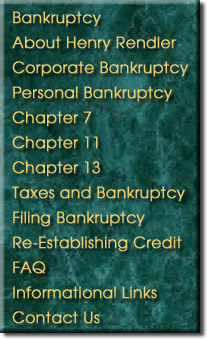|
|

|
|
| |
||
| What
is The Role of the Bankruptcy Trustee? What is Notice of Commencement of Case? What is the Meeting of Creditors? What is a Discharge Notice? What "exempt" properties are debtors entitled to from sale of the Trustee? What options does a debtor have in regards to secured consumer debt? Can Utility Utility Debts Be Discharged in bankruptcy? Does the Bankruptcy Code prohibit discrimination based on a bankruptcy filing? How long is bankruptcy on my credit report? What is Chapter 13 Bankruptcy? What is a Chapter 13 Bankruptcy plan? Are Chapter 13 Plans are Based on the Debtor’s Income and Assets?
What is Notice of Commencement
of case?
What is the Meeting
of Creditors? What is a Discharge
Notice? What assets are debtors
entitled to exempt from sale by the Trustee? What options does
a debtor have in regards to secured consumer debt?
Also, it sometimes is possible for the debtor to keep the collateral, keep making the payments, and not officially reaffirm the debt. In this instance, if the debtor defaults, the secured creditor will have the right to proceed with repossession of the property, but will not be allowed to hold the debtor personally liable if the property is not of sufficient value to pay off the debt.
Can Utility Debts Be Discharged in bankruptcy? Public utilities, such as the gas and electric company, are not permitted to discontinue service because of a bankruptcy filing. However, if the utility bill is included in the bankruptcy and not paid, then the utility has the right to demand that the debtor pay a deposit within 20 days to ensure the continuation of service. Sometimes, the requested deposit is several times the amount of the bill, so it often makes sense for a cash-strapped debtor to simply pay the bill. Utility bills for service arising after the bankruptcy filing are not included in the bankruptcy, and must be paid.
Does the Bankruptcy Code prohibit discrimination based on a bankruptcy filing? The Bankruptcy Code contains an "anti-discrimination" provision, stating that government units and private employers may not discriminate against a person solely because that person has filed bankruptcy or was insolvent. Also, if a debtor has lost his driver's license solely because of his inability to pay damages resulting from an accident, then a bankruptcy discharge will allow the debtor to get his license back. How long is bankruptcy on my credit report? The fact that a debtor has filed bankruptcy
can appear on credit reports for 10 years. If the debtor was delinquent
in his bill payments, then he may have already had bad credit prior
to the bankruptcy. If the debtor receives a discharge of his debts,
then he will often be in a good position to pay his current bills,
and may be able to get new credit. A debtor is entitled to receive
a discharge in bankruptcy once every 6 years. What is Chapter 13 Bankruptcy? Chapter 13 bankruptcy is a court-supervised debt adjustment procedure, available for individuals with regular income, who have unsecured debts totalling less than $269,250 and secured debts totalling less than $807,750. The Chapter 13 debtor files a bankruptcy petition which is virtually identical to the Chapter 7 petition, including a detailed financial statement and listing of assets and liabilities. The filing fee for the court is $185. In addition, the debtor typically pays his attorney some portion of the total agreed-upon fee in advance. What is a Chapter 13 bankruptcy plan? The Chapter 13 debtor files a "plan", which provides for repayment of debts over a 3-5 year period. The plan is usually a form, one page in length. The court appoints a Chapter 13 trustee, whose job it is to receive payments from the debtor, and to disburse funds to creditors. The Chapter 13 trustee acts basically as a disbursing agent, and not as a liquidating trustee. The debtor remains in possession of all of his property, exempt and non-exempt. Upon completion of payments under the plan, the debtor typically receives a discharge of his debts, even if he has paid less than 100% of the debt, with some exceptions. The first payment under the plan is due 30 days from the date the plan was filed.
Are Chapter 13 Plans Based on the Debtor's Income and Assets? Most Chapter 13 plans provide for only
a partial repayment of debt. To be approved by the court, the debtor's
plan must provide for the debtor to pay to the Chapter 13 trustee
a sum equal to the debtor's disposable income for at least 36 months,
after taking into account the debtor's regular monthly living expenses.
Also, the plan must pay the creditors at least as much as those creditors
would receive if the case were in
Chapter 7. Thus, the amount that will be repaid to creditors is
dependent upon the debtor’s income and assets. The debtor's plan also
needs to be filed in good faith. For an appointment in regards to bankruptcy, the law office of Henry Rendler can be contacted at 408.293.5112.
|

|
|
|
|
||
